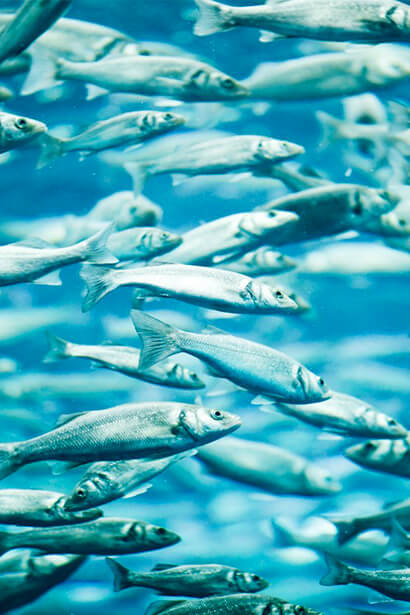The fact that fish is healthy is now common knowledge, but not everyone is aware of the fact that bluefish is better than other types of fish. The sardines are part of the great “blue” or “oily” fish family, which in fact doesn’t correspond to a scientifically defined group of species, but describes those fish that have the blue back and silver belly. A peculiarity of these types of fish is that they abound in the Italian seas and for this reason they are cheaper than others: Sardines in particular has always been known as a “poor fish”.
Delicius selects only the tasty Sardine pilchardus and handles them directly on the fishing site to make sure they maintain all their precious qualities and all their nutrients.
In the big “family” of bluefish, sardines play a very important role. They are a small fish that does not exceed 20 cm in length, elongated, side-compressed, of a greenish/blue on the back and silvery white on the hips and belly. A sardine differs from an anchovy because it has its mouth in the medial position, while the anchovy has it facing downwards when closed.

In the big “family” of bluefish, sardines play a very important role. They are a small fish that does not exceed 20 cm in length, elongated, side-compressed, of a greenish/blue on the back and silvery white on the hips and belly. A sardine differs from an anchovy because it has its mouth in the medial position, while the anchovy has it facing downwards when closed.
Here are 8 good reasons to consume sardines regularly:
- High protein content: over 18% of a sardine is protein: good for the muscles and immune system allies.
- They have fats similar to those contained in vegetables, characterized mainly by “unsaturated” compounds.
- Rich in Omega 3: The high content of this unsaturated fatty acid produces positive effects on cholesterol levels, helps prevent arteriosclerosis, reduces triglyceride levels, and reduces chances of suffering from cardiovascular diseases.
- Vitamin D, A, B2, B3 and B12 sources: Vitamin D plays an essential role in bone health as it contributes to increasing calcium absorption. Vitamin B12, on the other hand, helps to increase their repertoire of nutrients that support bone health.
- Thanks to the high presence of oligo-elements such as iron, phosphorus, sodium, magnesium and calcium, it is a highly recommended product for sportsmen, teenagers and pregnant women.
- Calorie intake of 150 calories per 100 gr. The fat content is to be noted, it varies greatly because of many factors, such as the geographic area of fishing (the Adriatic ones are more greasy compared to those coming from the Tyrrhenian sea) and the time of the year they were fished (summer makes them a little more greasy – but also more tasty).
- Can be eaten fresh or in oil: in both cases a good levels of Omega 3 is maintained.
- The “Nutrition Guidelines” encourage its consumption at least 2-3 times a week thanks to its nutritional principles.
Sardines are therefore a highly recommended food: cheap, easy to cook and healthy. Discover all our recipes, starring this tiny fish, on the Delicius Online Food Magazine! Sardines are perfect to give an unusual touch to your lunch-break salad, or to enrich a nice dish of spaghetti!




You must be logged in to post a comment.